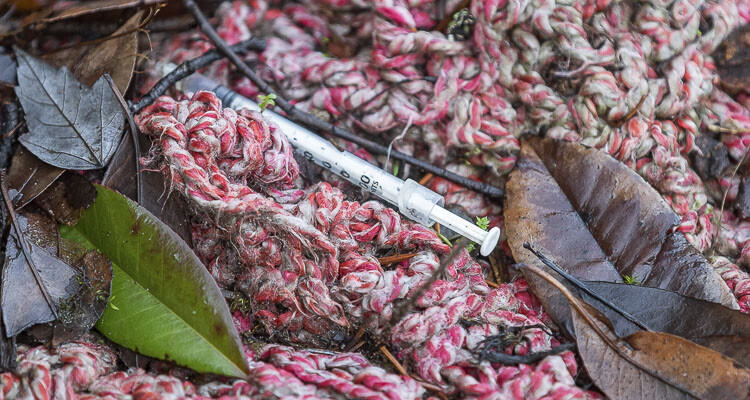
The new law came just as local governments were preparing to enact their own ordinances on drug possession
Brett Davis
The Center Square Washington
Lawmakers from both sides of the aisle expressed relief after the Washington State Legislature on Tuesday passed a bill setting sanctions for drug possession in the state.
The signing of Second Engrossed Second Substitute Senate Bill 5536 into law by Gov. Jay Inslee hours later means a temporary statute that was set to expire in less than two months – essentially decriminalizing drug possession in Washington – will not go into effect.
The new law came just as local governments were preparing to enact their own ordinances on drug possession, likely resulting in a confusing patchwork of laws throughout the Evergreen State.
“I believe we passed a bill yesterday that correctly balances accountability and compassion,” Rep. Spencer Hutchins, R-Gig Harbor, said in a Wednesday news release. “It is not perfect, but it is miles ahead of what we saw on the final day of the session and a huge improvement over what we have had for the past two years under the temporary Blake fix that has led to the awful scenes we now see on our streets across the state. Hopefully, we will continue to build on this in years to come.”
In February 2021, the state Supreme Court ruled in State v. Blake that Washington’s felony drug-possession statute was unconstitutional because it criminalized “unknowing” drug possession, meaning that people could be arrested and convicted even if they did not realize they had drugs in their possession.
Later that year, the Legislature passed a stopgap measure – set to expire on July 1 – making drug possession a misdemeanor.
The Legislature failed to pass a permanent fix during this year’s 105-day session that ended on April 23. On May 2, Inslee announced plans to call the Legislature into a May 16 special session to pass a new drug possession law.
Several other lawmakers echoed the sentiment that the new drug possession law is not a panacea, but said it is an improvement in terms of how the state deals with substance abuse and addiction.
“This measure strikes a balance between accountability and compassion,” Rep. Peter Abbarno, R-Centralia, said in a Tuesday news release. “And while it may not have all the hallmarks of a comprehensive criminal justice or substance abuse bill, it provides sufficient flexibility to the criminal justice system, as well as substance abuse and mental health providers, to adequately address community concerns with crime and drug use.”
Sen. Manka Dhingra, D-Redmond, agreed and tied the new drug possession law to wider efforts related to behavioral health.
“No single bill can solve the substance use crisis our state is facing, but this legislation is an important bipartisan step forward to support a statewide public health approach that balances treatment and accountability,” the deputy majority leader in the Senate said. “It is just one part of the many significant steps we took this session on behavioral health – from expanding 988 crisis hotline services to establishing a system for crisis relief centers around the state to growing the behavioral health workforce – all backed by $1 billion in funding.”
Republican leadership applauded the bill as a “workable solution” on drug possession.
“This bill isn’t perfect, but it is a strong step in the right direction and addresses major shortcomings in the law that has proven to be such a failure these past two years,” Senate Republican Leader John Braun, R-Centralia, and House Republican Leader Drew Stokesbary, R-Auburn, said in Tuesday news release. “This policy will provide opportunities to those who seek treatment for drug addiction and hold accountable those who refuse it.”
The new law retains criminal penalties in the form of making intentional possession or public use of small amounts of illegal drugs a modified gross misdemeanor, punishable by up to six months in jail for the first two offenses and up to a year after that, while also boosting resources to help those struggling with addiction by providing $44 million for drug treatment and recovery services.
“Substance use disorder is not a partisan issue but a human one,” Sen. June Robinson, D-Everett, observed in a Tuesday news release. “We know our state must continue to invest in systems based in real solutions like treatment and strike a balance between care and accountability – that is exactly what this bill does.”
This report was first published by The Center Square Washington.
Also read:
- Vancouver mayor pro tem acknowledges the mayor ‘set the trap’ for Michelle BelkotAudio reveals Vancouver mayor pro tem described mayor’s plan to provoke Belkot at C-TRAN meeting, sparking removal and lawsuits.
- Opinion: An unacceptable tax burdenNancy Churchill outlines new tax proposals in Washington state, warning of growing burdens on working families amid budget shortfalls and government overspending.
- Expect delays on eastbound SR 14 West Camas Slough Bridge for annual inspection, SaturdayAnnual inspection will close the eastbound lane of SR 14 in Camas.
- Vancouver Police investigate shootingVancouver Police investigate a carnival shooting involving youth and a firearm.
- POLL: Is it time for new leadership at Vancouver City Hall?A new weekly poll asks whether Vancouver voters should prioritize replacing the mayor and city council in the 2025 election.
- Opinion: How will the majority party’s new budget and tax proposals affect you?Rep. John Ley critiques the state’s proposed 2025-27 budgets, warning of record-breaking tax hikes and economic impacts.
- Opinion: Washington’s EV sales far short of next year’s state mandateTodd Myers highlights how Washington’s EV sales fall short of next year’s mandate, raising concerns over rising car prices and limited options.











